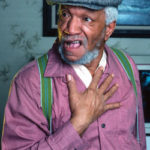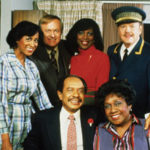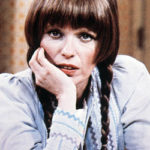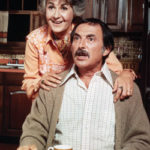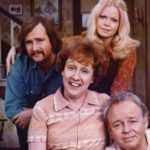Norman Lear
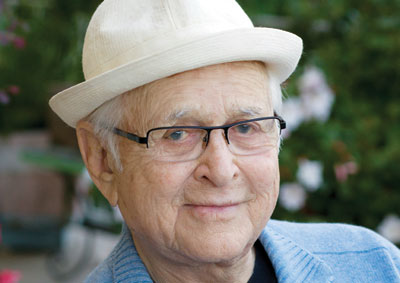
“I just wanted to make people laugh. We dealt with serious subjects, but I saw that there was humor in everything.” (Photo Courtesy Norman Lear, © Alex J. Berliner)
Norman Lear sums up his incredible life and career this way in the preface to his book Even This I Get To Experience: “In my 90-plus years I’ve lived a multitude of lives. In the course of all these lives, I had a front-row seat at the birth of television; wrote, produced, created, or developed more than a hundred shows.”
More than just an entertainer, Lear is a man with a deep and abiding concern for the future of America. He counts among his many notable accomplishments his founding of the advocacy organization People For the American Way, and that he purchased a rare original copy of the Declaration of Independence so that he could tour it across the U.S. for people to be reminded of the history of the country he so loves.
Lear attributes his outspokenness to growing up during the years of the Depression in a family that “lived at the top of its lungs and the end of its nerves. They cared about everything and I mean everything,” he says. From humble origins, Lear would go on to make a fortune. At the height of his success, he had nine shows on the air at the same time, with a total audience of 120 million. Along the way, Lear experienced his share of personal setbacks. But he says his gratitude at the simple miracle of being alive has always carried him through difficult times. With a smile and a tug on his signature white hat, he explains, “No matter what I went through, I was always learning. Every day I think to myself, Even this I get to experience.”
Jeanne Wolf: You’re a great storyteller. When did you know that you had that gift?
Norman Lear: I probably knew it later in life than you would imagine. It started with just a lot of hard work, first in publicity and including, believe it or not, a business making little ashtrays that fastened to the lip of a saucer for a cup. It was a totally worthless invention that for some strange reason sold well one Christmas. What changed things is that I finally got a break writing comedy sketches for shows like Martin and Lewis.
JW: Then you came up with All in the Family, which was not that easy to get on the air. What gave you the courage to stick with it when other people were telling you, “We can’t put this on TV”?
NL: It didn’t seem to me to take all that much courage. I just wanted to make people laugh. I wanted to bring the audience to their knees emotionally through laughter. We dealt with serious subjects, but I saw that there was humor in everything.
JW: Not everyone appreciated your message at the time.
NL: Some people started saying, “If you want to send a message, use Western Union. Stop using television.” At the time, the average sitcom was about something like “the roast is ruined and the boss is coming to dinner.” There were hundreds of hours of programming where there was no Vietnam War, no racial problems, no economic problems. Everybody was happy and cheerful. In its own way, that’s a strong point of view. We were simply going in a different direction.
JW: What guided you as you put together one hugely popular series after another?
NL: I always felt that what makes me laugh is going to make you laugh. And what makes me care or cry is going to make you care or cry. I don’t have anything else in the world to go on. I express feelings. And that’s what I think I need from my Congress and what America needs from its leaders. What are you really feeling here? Don’t give us the B.S.
JW: What would you say is at the root of your deep concern for your country?
NL: My generation was in love with America. When I was a kid, every school had civics classes. We learned early on about our Declaration of Independence, our Bill of Rights, the First Amendment. And so we had a reason to be in love with the core values of this country. And we accomplished a lot. But the fact that we did a good job didn’t make America God’s chosen, although we started to believe it. The promises from our forefathers haven’t been delivered yet. We haven’t made good on all these promises. It’s time we paid attention to making good on them.
JW: When did you first begin to develop sensitivity to racism and bigotry?
NL: I remember I was fooling around with this little crystal radio and I came across a broadcast from Father Coughlin, a vicious, anti-Semitic, anti–Native American, anti-FDR, rogue priest who was preaching hate. It was the first time I realized that there were people out there who didn’t like me because I was born to Jewish parents. And that was startling. But I was taking civics classes and I was being taught that, wait a minute, in my country, that’s un-American. You do not tell people they’re bad Christians or good Christians or bad Americans or good Americans depending on a religion. That was a sustaining moment for me.
JW: So did you let your beliefs be known at a young age? Did you take a public stand on that when you were growing up?
NL: In high school, I entered the American Legion Oratorical Contest. My subject was “The Constitution and Me,” and I talked about how, because I was a member of a minority, my appreciation for the guarantees of the Constitution and the Bill of Rights were probably a little keener because I needed them more. I won that competition and got a scholarship to college, which I otherwise never could have afforded.
JW: Racial dissension, fear of people different from us is still alive and well. The rhetoric is hateful and harsh. Does that scare you?
NL: It doesn’t scare me because it’s the human condition. What scares me is the time it takes for people to react. Basically, this country on the one hand adores what it stands for; on the other hand, it doesn’t want to deliver on what it stands for. So, there isn’t enough conversation about this. And there isn’t enough leadership moving us in the direction of that conversation.
JW: Clearly, you’re a fighter for what you believe in. You also fought many battles with the networks over what was acceptable in prime time. Do some incidents still stick out in your mind?
NL: I’m thinking of an episode of All in the Family. Archie and Edith are married 25 years, it’s a Sunday and they’re in church. The kids decide to surprise them with a brunch for their 25th wedding anniversary. So we find Mike and Gloria alone in the house. Mike realizes his parents won’t be back for a little while, and they go upstairs to the bedroom to have a little fun. A few minutes later, Archie comes back early because he hated the sermon and he hated the minister. Mike and Gloria come running down the stairs buttoning up their clothes. Archie says, “11:10 on a Sunday morning?” The network censor wanted that line out. Why? Because it pointed out to the audience exactly what had happened. So we had a confrontation, and I told them if they cut it, I wouldn’t be there the next day. An hour before the show aired, I still wasn’t sure they had left it in. But I didn’t think I was courageous. I was just resisting silliness. I thought, Archie can’t say that line? That’s silly.
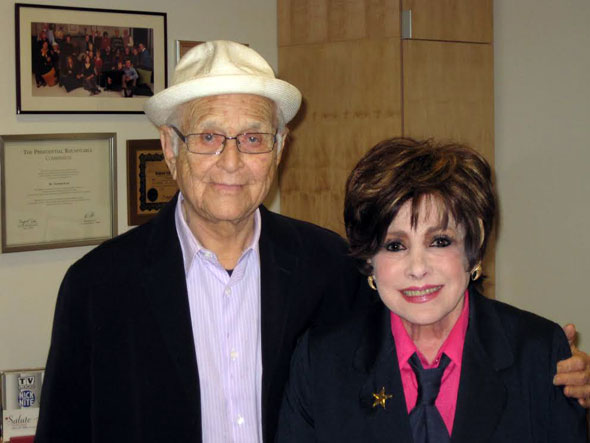
JW: You’ve said that of all the characters you created, the closest one to you is Maude.
NL: I thought of her as reflexively liberal as Archie was reflexively conservative. When Maude said things, she didn’t take full responsibility for getting the facts she needed to back up what she said. That’s a pretty good description of me. I make no bones about it. I’m proud to be a liberal, but I’m not proud that I don’t know enough details to make my case more strongly.
JW: As you get older, people seem to treat you with even more respect, and they want to tap into your wisdom.
NL: When I was 88 or 89, people were sweet and perhaps deferential. But when I crossed over into my 90s, suddenly I was getting a standing ovation just for standing straight. I’d take a few steps and it was overwhelming. I was also considered wise — “Mr. Lear, what do you think about …?” It wasn’t the same at 88.
JW: Can you sum up any of the wisdom that you have to share?
NL: I’m thrown by the word wisdom. My bumper sticker reads, “Just another version of you.” And maybe that’s the lesson of my life — the thing I would most wish to be understood, from anything I’ve said. It means that, as a human being, I’m inherently capable of the worst behavior that we see in any other human being on the globe, and I’m capable of some of the best. We are each of us as human beings capable of the best and the worst. That’s why we are versions of each other. It’s hard to be a human being. In life, the harder the competition, the more we pay for it with energy, with effort, with money. The harder the game, the more we give to it, the more we care about it. So the wonder is, in this game of life, which is so bloody hard, why don’t we experience it with more pleasure?
JW: Are you speaking of yourself? Look at the things you’ve done. You’ve attacked life with passion.
NL: I did find enthusiasm and passion, but there was a good deal of fear early on. I wasn’t born to understand this. I grew to understand it.
JW: What gets you through your day?
NL: Tomorrow. I believe in two small and important words in the English language — over and next. When something is over, it’s over. When I fall asleep, that day is concluded. I’m on to coffee, the taste of tomorrow morning’s coffee. And I think that if you see a connection between over and next, that’s what is meant by living in the moment. At the risk of sounding sanctimonious, I really do see it that way. Living this moment is what we have. You don’t know about the next.
On with the show! Lear today is producing an update of One Day at a Time for Netflix, but with a Cuban-American matriarch. He’s also shopping around a comedic series, Guess Who Died?, about life in a retirement community. Below: Some of his greatest hits.
